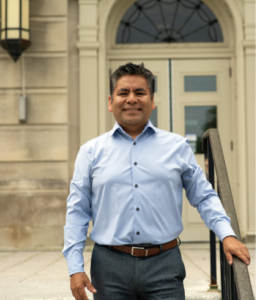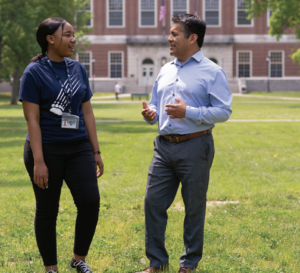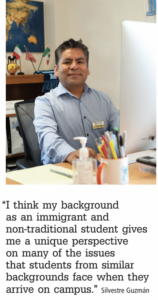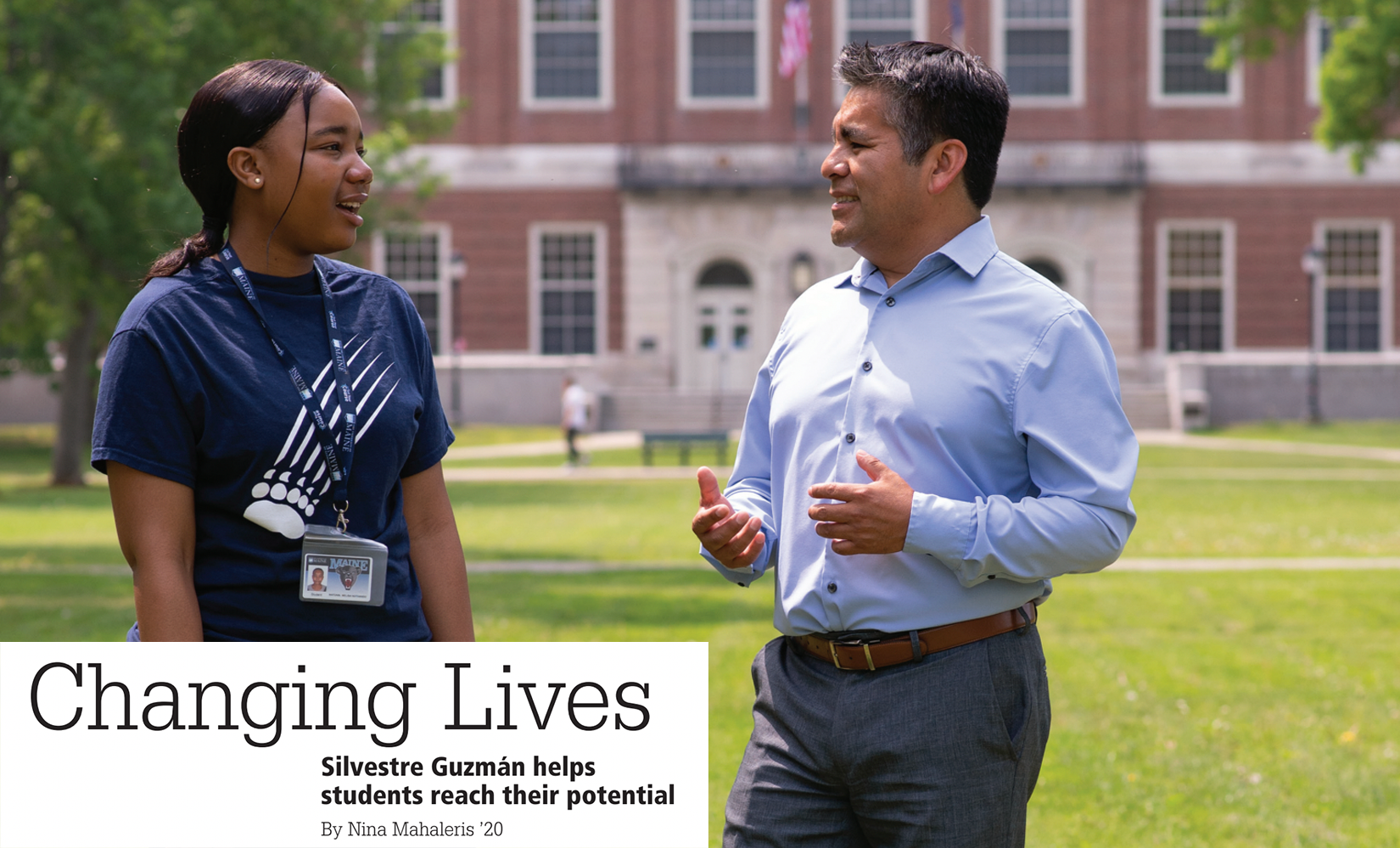Changing Lives
Silvestre Guzmán ’13, ’17G helps students reach their potential
By Nina Mahaleris ’20′
[To view story in the MAINE Alumni Magazine, click here]
For many students, the path to higher education is straightforward.
It often begins early — when parents enroll their child in kindergarten or prekindergarten, then continues for the next 12 or so years, until that child is old enough to start carving out a path to adulthood.
Silvestre Guzmán’s educational journey was more complicated.
 Guzmán ’13, ’17G, who serves as the University of Maine’s senior associate director for diversity and access, was born into extreme poverty in Oaxaca, Mexico, the oldest of four siblings.
Guzmán ’13, ’17G, who serves as the University of Maine’s senior associate director for diversity and access, was born into extreme poverty in Oaxaca, Mexico, the oldest of four siblings.
Guzmán’s schooling was a very different experience from the early education system that we know in the U.S. today. “The school that I attended as a child did not offer any sports, music or any co-curricular or extracurricular activities,” he said.
School was “purely rudimentary academics,” offering language, basic arithmetic, and social science.
Though he enjoyed school as a child, it ended far earlier than for most. At 11 years old, Guzmán left home so he could do agricultural work to help his parents with household expenses. Instead of playing with friends after school and imagining exciting, worldly adventures they’ll have when they grew up, Guzmán was living a different reality.
“I was curious about the world but not for learning purposes, but rather about my survival beyond the village where I was born,” he said. “My socioeconomic condition didn’t allow me to think about traveling for leisure to learn more about the world.”
Building a life in Maine
When Guzmán first arrived in Maine in 1999 as a migrant worker, he had a sixth-grade education and didn’t know any English. The culture shock made it even harder for him to adjust to his new environment.
“I couldn’t communicate with the local community [in the Bangor area] because I didn’t speak English and it made me feel isolated,” he said.
The weather was another thing.
“In Mexico, I was used to mid-80s Fahrenheit year-round and found it hard to adjust to the frigid winter temperatures. Before moving to Maine, I hadn’t seen snow so this was a new experience for me,” he said.
Guzmán never shied away from hard work, even when it meant clearing brush and logging for the paper harvesting trees and from sunup to sundown six and a half days a week. The work was grueling, he recalled. “We would leave our rooms around 3 a.m. and wouldn’t return until 7 p.m. or later.”
 Before becoming a legal resident and eventually a naturalized U.S. citizen, Guzmán was an undocumented immigrant on the West coast from 1993 to 1999. During that time, he said, he was employed and paid state and federal income taxes, along with contributing to Social Security and Medicaid.
Before becoming a legal resident and eventually a naturalized U.S. citizen, Guzmán was an undocumented immigrant on the West coast from 1993 to 1999. During that time, he said, he was employed and paid state and federal income taxes, along with contributing to Social Security and Medicaid.
“Since my arrival in the U.S., I have never used any social welfare benefits, including unemployment benefits. I have always done whatever it takes to earn a paycheck.”
Like most migrant workers, Guzmán thought he would return home after the work season was over. Ironically, it was a car accident that solidified his connection to Maine.
One morning on the way to the job site, the driver of the workers’ van fell asleep at the wheel, causing the van to roll several hundred feet. Two of his co-workers were killed in the crash. Guzmán walked away with only minor scratches.
Guzmán’s uncle, who was seated next to him in the van, suffered severe head trauma. After undergoing two cranial operations in Bangor, his uncle was placed in a rehab unit, where Guzmán would visit him almost daily. Guzmán’s now-wife was working as a registered nurse in the rehab unit at the time.
When his uncle recovered two months later, the crew headed back south — without Guzmán. “I stayed in the Bangor area and that’s where my journey at UMaine began.”
School, school, and more school
With the work season behind him, Guzmán set his sights on finding a new job in Maine. After several failed attempts, he took a position washing dishes in one of the dining halls on UMaine’s campus.
It was there that Guzmán decided it was time to return to school.
With the help of his now-wife, he started taking some courses at Bangor Adult Education to improve his English. He then earned his GED and started taking classes at Eastern Maine Community College before transferring to UMaine in 2009.
He continued washing dishes full-time for the next few years while working on his degree. By 2013, he had graduated with honors (summa cum laude) and enrolled in a master’s program in Student Development in Higher Education. He completed his master’s degree four years later in 2017.
College wasn’t something Guzmán envisioned for himself as a child.
“I thought my life would follow the path of many immigrants who come to work in the U.S.,” he said. “I would migrate to the U.S., do seasonal agricultural work, and go back home. Pursuing higher education was not part of my plan as a kid.
“No one in my family has finished high school and my family never discussed it with me or my siblings,” he said. His parents completed up to third and fourth grade.
Since his family has a limited understanding of education, Guzmán said, they were indifferent when he told them he was enrolled at UMaine to earn his undergraduate degree.
When he tells his family that he’s now taking some doctoral classes in hopes of earning his Ph.D. in the future, they don’t fully understand why he’s doing it, he said. Still, that doesn’t stop him.
“I have always been hungry for knowledge and that hunger has served as great motivation to continue taking classes … I want to take full advantage of the opportunities that my beloved institution offers. UMaine feels like a second home to me and I hope to finish my career here,” Guzmán said.
Making lasting connections at UMaine
“Fearless,” is the word that comes to mind for Christopher Richards ’10, ’17G when he talks about Guzmán.
Richards serves as the director of admissions at UMaine and supervises Guzmán, who he has known for nearly a decade. “He loves working at the university. It’s a piece of his identity; that’s why he’s good at what he does,” Richards said. “I couldn’t be more proud of him.”
Richards and Guzmán share a unique experience of breaking generational molds, thus changing the future course of entire family trees.
Going to college isn’t the norm for every family — and for some, the notion of higher education itself may be outright discouraged. Despite their different cultural backgrounds — Richards’ Maine roots go back many generations — this is what bonds Richards and Guzmán.
“I didn’t even comprehend what college was until I started working at UMaine,” Guzmán said. “I didn’t know there was such a thing as an education beyond high school. My parents have a third- and fourth-grade education, and I was never exposed to post-secondary education.”
Now, Richards and Guzmán work to develop new initiatives to reach prospective students from increasingly diverse backgrounds and encourage them to consider an education at UMaine. “The work we do actually does matter in terms of changing lives and frankly, changing family trees,” Richards said.
Beyond that, though, they help students and their families feel at ease on campus and see themselves in Maine, even though it may look completely different from their home.
Even before Jon Guzmán ’25 arrived on campus, he was already in touch with Silvestre Guzmán.
“My first point of contact [at UMaine] was with Silvestre,” the younger Guzmán, a current UMaine student said. Jon said he was browsing UMaine’s website, contemplating his college decisions, when he came across Silvestre and discovered the two shared the same last name, despite not being related.
That alone was enough to encourage him to give Silvestre a call and find out more about the university. Now, he looks up to Guzmán as not just another staff member on campus, but a friend and mentor.
“He does everything for the university because he wants the University of Maine to prosper. He wants everyone to feel like they are one … He’s just a man who gives,” the younger Guzmán said.
Guzmán’s commitment to inclusivity and equality extends beyond campus, too. As a member of the Greater Bangor Area Branch of the NAACP, he has been a vital part of the organization’s effort to help individuals facing racism in their schools or workplaces, said Chapter President Michael Alpert ’72G.
Guzmán served multiple terms as the branch’s vice president and on the planning committee, helping to plan events such as the Dr. Martin Luther King, Jr. Breakfast Celebrations held on campus each January. Guzmán also helped design a much-needed website for the branch, Alpert said.
“Silvestre’s positive and committed approach to civil rights advocacy has made him a friend to all who share his passion for racial justice,” said Alpert.
While at one point language was a barrier to connecting with others, it’s now part of what makes Guzmán invaluable on campus. When Hispanic students and their families visit, they are put at ease when they meet with someone who speaks Spanish. Guzmán previously served as the director of the university’s multicultural student center from 2015 to 2018.
“To see [students and families] light up when they meet with him is invaluable,” Richards said.
 According to the U.S. Census, just two percent of Maine’s population is of Hispanic origin. Maine is becoming more diverse though, and part of Guzmán’s job, specifically, is to reach students from these diverse backgrounds and expose them to a potential future at UMaine.
According to the U.S. Census, just two percent of Maine’s population is of Hispanic origin. Maine is becoming more diverse though, and part of Guzmán’s job, specifically, is to reach students from these diverse backgrounds and expose them to a potential future at UMaine.
“I think my background as an immigrant and non-traditional student gives me a unique perspective on many of the issues that students from similar backgrounds face when they arrive on campus,” he said.
That makes a difference, especially to current and prospective students from minority backgrounds who may struggle to feel like they belong in Maine. “I look up to him as a symbol for what the University of Maine should be prioritizing because in reality, a lot of the students feel out of place,” Guzmán, the current student, said.
Dr. Robert Dana ’80, the university’s vice president for student life and inclusive excellence and dean of students, echoed those sentiments. Dana said Guzmán became a mentor and a guide for students, faculty and staff, and a respected advocate on campus in his former role as director of the multicultural center.
“Silvestre’s story is one of hope and ambition coupled with fate leading to a wonderful and remarkable impact on society,” Dana said.
Guiding parents and students through the admissions process, which he acknowledged can be complicated, is the part of Guzmán’s job that he finds the most joy in. He often shares his own story in hopes of inspiring others in similar positions to continue their education and reach their full potential — and he certainly has plenty of lived experiences to draw from.
“My educational journey has been long and arduous but somehow I persisted and succeeded,” Guzmán said. “Whenever I can, I use my personal story to motivate young students that when you have determination, you can achieve your educational goals.”
